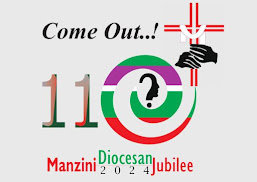In
the past 20 years, the Catholic Church has celebrated a couple of
synods for Africa. The first one was in 1994 and the second one in 2009.
At
the end of the second synod, 57 propositions were presented to Pope
Benedict XVI who would then prepare the final document.
(Can be found by clicking here)
Proposition
24 regarded “Good governance”. Among other things, it says:
“The Synod Fathers urge Episcopal Conferences at all levels to
establish advocacy bodies to lobby members of parliament, governments
and international institutions, so that the Church can contribute
effectively to the formulation of just laws and policies for the
people’s good.”
I
believe this proposition was born out of the great experience our own
Southern African Catholic Bishops' Conference has in South Africa
through the “Catholic Parliamentary Liason Office” (CPLO) based
in Cape Town.
“The Catholic Parliamentary Liaison Office (CPLO) is an agency of the Southern African Catholic Bishops’ Conference which is responsible for maintaining contact and communication between the Catholic Church and the parliament and government of South Africa. It does this by making formal submissions to parliamentary committees, by setting up meetings between Church leaders and government Ministers and officials, and by conducting and publishing research on a wide variety of subjects.The CPLO bases its activities on the values of Catholic Social Teaching, and seeks in this way to contribute to the common good of all South Africa’s people by helping to develop legislation and public policy that promotes and respects human dignity and freedom.”
Thanks
to the “Denis Hurley Peace Institute” and the South African CPLO
our diocese will now be able to start her journey towards the birth
of our own CPLO.
The
first step will be a “public policy advocacy workshop” which will be held at Caritas next week (October 1 - 2). It will
consist of two parts, each lasting one day.
The
first day will cover mainly theoretical aspects of advocacy: Why
does civil society undertake advocacy? What are the legal and
constitutional bases for advocacy? Public policy and legislation. The
difference between lobbying and advocacy. Of special interest to
church organisations will be a short session dealing with the
Christian Social Teaching basis for advocacy.
The
second day will be devoted to more practical aspects: How to
identify topics for advocacy. Finding opportunities for advocacy.
Strategies and tactics for effective advocacy. How to draw up a
submission to parliament or government. Effective networking and
sharing of resources for better advocacy.
The
workshop is intended to be an introduction to these questions, and it
is hoped that participants will contribute their own experiences of
trying to do advocacy in Swaziland, as well as their plans for future
efforts.
"The Synod entrusted every aspect of its work to the prayerful intercession
of the Blessed Virgin Mary: Our Lady of Africa, Queen of Peace." (Proposition 57)
The CPLO together with the Jesuit Institute offers a weekly reflection
and guidelines for prayer (like the one below)
and guidelines for prayer (like the one below)






